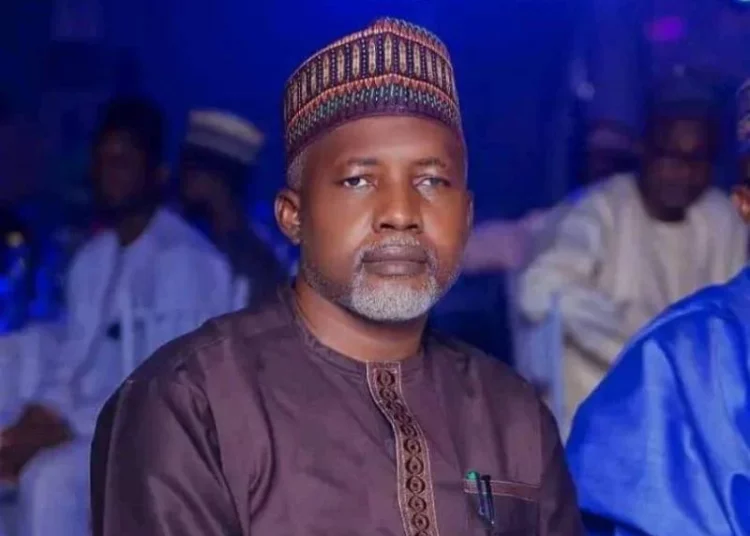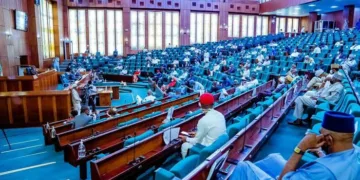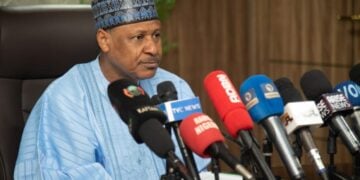The Minister of State for Humanitarian Affairs and Poverty Alleviation, Dr Tanko Sununu has expressed concern over Nigeria’s deteriorating humanitarian crisis with more than three million people internally displaced as a result of flooding, insecurity and other natural disasters.
Speaking during the inauguration of the House of Representatives Ad-hoc Committee on Flood Management and Response, the Minister said the combined effects of natural disasters, insecurity, and shrinking donor support have created a “critical humanitarian challenge” for the country.
The former member of the House of Representatives warned that millions of citizens risk sliding deeper into hunger and malnutrition as global aid funding dwindles.
“Globally, humanitarian funding is shrinking, and Nigeria is not exempt. Just a few days ago, the World Food Programme suspended some of its activities, which had supported more than 1.2 million Nigerians with emergency transfers in the North-East. This leaves over 300,000 children at risk of malnutrition, while more than 200,000 are already receiving treatment,” he noted.
According to United Nations estimates cited by the minister, over 24.8 million Nigerians have suffered some form of hunger, while more than 3 million people remain internally displaced as a result of flooding, insecurity, and other natural disasters.
“Out of this 65 percent, more than 70 percent are smallholder farmers. Sadly, most of them have lost their farmlands and livelihoods to floods and droughts,” he said.
“In response to the crisis, the Federal Government is strengthening interventions through the National Social Investment Programme (NSIP),” he said.
The minister disclosed that under the Government Enterprise and Empowerment Programme (GEEP), smallholder farmers have received interest-free loans of ₦300,000 each to help them recover from losses.
He also revealed that more than 5.9 million households—approximately 25 million Nigerians—have benefited from ₦419 billion in conditional cash transfers meant to cushion the impact of economic hardship and sustain vulnerable families.
The chairman of the committee, Hon. Maidala Balami said flooding has become more than a seasonal occurrence, to a “national emergency that demands urgent, coordinated, and strategic action.
“Each year, lives are lost, properties destroyed, livelihoods disrupted, and the socio-economic fabric of entire communities severely affected,” he noted.
He declared that the time for piecemeal approaches was over, saying, “What we need is a comprehensive national framework—one that encompasses prevention, early warning systems, emergency response, community resilience, infrastructure development, and climate adaptation strategies.”
He urged all stakeholders, including civil society, private sector, and international partners to join efforts in developing a sustainable national response to flooding and humanitarian emergencies.
“This inauguration is not just ceremonial, it is a clarion call to duty. We shall listen to affected communities, interface with experts, and ensure that our report provides a blueprint for lasting solutions,” he said.
The Speaker of the House of Representatives, Hon. Abbas Tajudeen who was represented at the inauguration by the Leader of the House, Prof. Julius Ihombvere charged members to provide immediate and long-term solutions to Nigeria’s recurring flood crisis.
“Flooding goes beyond being a mere environmental issue. It is an economic, social, and humanitarian challenge,” the Speaker declared. “Every year, thousands of families are displaced, farmlands are submerged, and critical infrastructure is washed away. These tragedies demand deliberate and well-coordinated responses.”
The Speaker stressed the commitment of the House to addressing matters that directly affect Nigerians, including natural disasters.
“The House expects this committee to identify both the immediate and long-term measures required to prevent loss of lives and property, while recommending strategies that will move the nation from reactive to preventive measures,” Abbas said.
He further directed the committee to pay special attention to legislative gaps hindering effective flood management. Where laws are weak, outdated, or insufficient, he said, the House stands ready to strengthen the legal framework to better protect Nigerians.





